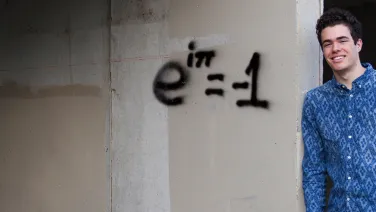Not just another number
In doing maths you’re not closing any doors, rather you’re opening up many more.
Picture a university lecture.
Did you imagine a huge auditorium with a few hundred people?
While this might often be the case, an ANU mathematics lecture is quite the opposite.
In fact, there could be as few as two or three people in a class.
And up until recently, one of those students was Eloise Hamilton, a Sydney-sider who moved to Canberra to study at ANU.
Eloise has since graduated from ANU and is headed for Oxford to start a PhD in mathematics.
She says that the great thing about studying mathematics is that you’re not just another number.
“It’s due to the fact that there are fewer people in your classrooms, and the lecturers are just so involved in your learning that you feel as though you matter,” she says.
And despite preconceptions, mathematics is social.
“People think maths is solitary, that you’re on your own working at your desk. I thought the same when I was in school but it’s just not like that. Maths is one of my most social subjects. And on top of that, when you do it with other people you learn and achieve much more,” she says.
Eloise also admits that it’s not just the community vibe that makes it great, it’s the fact that mathematics is rewarding.
“I think people are often afraid of doing maths. They tend to dismiss it because they think it’s too hard, or it’s not going to be useful. But the thing about maths is, once you give it a chance, it gives so much back,” she says.
Not only is it gratifying and social, but it provides you with the problem-solving skills that will get you noticed by employers in a variety of industries.
“In doing maths you’re not closing any doors, rather you’re opening up many more.”
Eloise explains that maths is involved in most science disciplines, “whether it’s physics, biology or chemistry.”
“Even outside of science, most fields involve structures and patterns, and mathematics comes into that. And anytime you need to model something, mathematics comes into that.
“I think that the skills I’ve learnt through maths could be applied to a whole range of jobs, and an employer would say, ‘You’ve got maths skills yeah you might just be the person I need’.”


